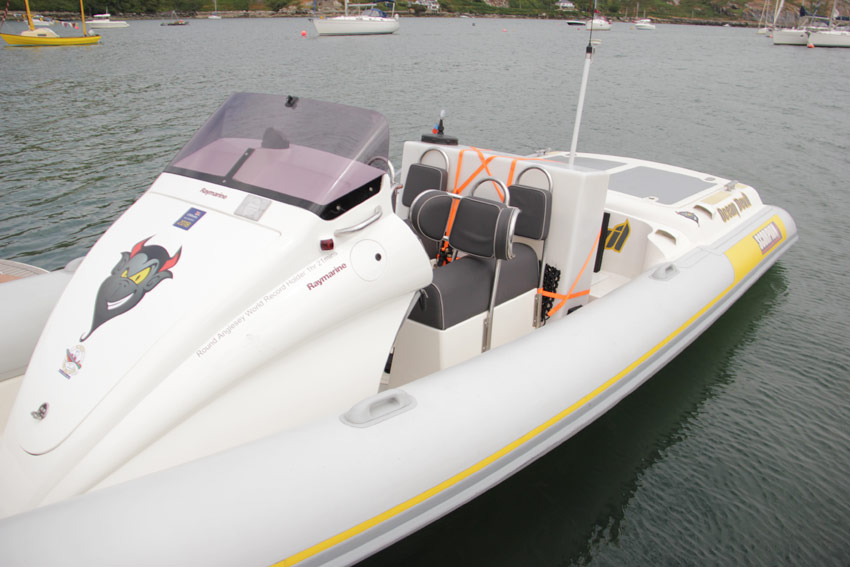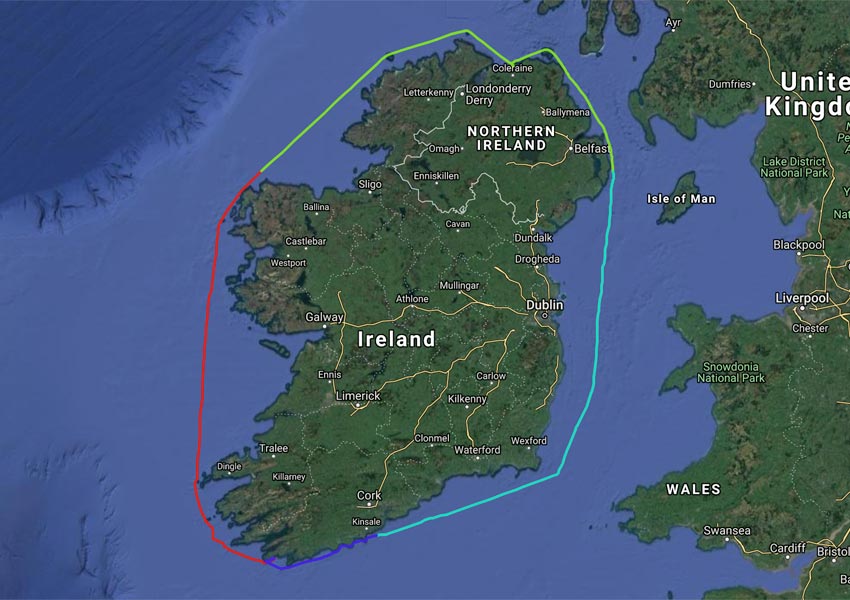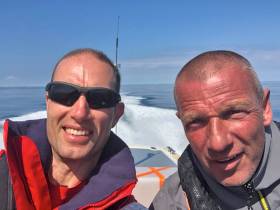Displaying items by tag: Dean Watson
British Duo Set New Round Ireland RIB Speed Record
#Record - Marc Lyne and Dean Watson have smashed the longstanding under-30ft Round Ireland powerboat record by almost half an hour, pending UIM ratification.
On Friday 13 July last the duo set a provisional time of 18 hours and 12 minutes — some 25 minutes faster than Philip Fitzgibbon and Mike Shanahan’s RIB record of 18:38:50 set in 2009.
And Lyne claims the time could have been more than two hours’ better “if we had not been beaten up for the last 40 miles from Cork to Crookhaven”.
While Team Hibernia set a sub-13-hour time with their wave-piercing powerboat in 2016, the record for under-30ft boats was still standing. And that’s the time on which Lyne and Watson put their sights after breaking the Round Anglesey time, in Watson’s home waters, back in 2015.
Over the next three years, the pair set about preparing their boat, a Scorpion 8.5m RIB dubbed Ocean Devil, to make the most of its Yanmar 315HP inboard engine.
 The Scorpion 8.5m RIB Ocean Devil prepped and ready to go
The Scorpion 8.5m RIB Ocean Devil prepped and ready to go
That involved a series of main prop modifications, as well as the installation of new fuel tanks with 400 litres’ capacity in addition to the 363l main tank, all while still getting as close as possible to the RIB’s top speed of 51 knots without revving over 3,750 rpm.
A key element of their set-up was using gravity to tap into the main tank through the service hatch by the helm, to avoid the use of battery-sapping pumps adding unnecessary weight.
With 45 knots achievable when fully loaded, and the engine mount put through rigorous sea and wake trials in the Solent, the next step was to reduce the overall weight. That meant new batteries, courtesy of DMS Technologies, and replacing the heavy A-frame with a removable radar post and a carbon post for the VHF antenna.
Safety remained paramount in their modifications, with all navigation lights replaced by LEDs, a new radio with built-in AIS from Raymarine, and a full set of offshore flares.
With the new and improved Ocean Devil ready for action, what Lyne and Watson needed next was a winning strategy. Cue a consolation with Mike Deacon, a RIB speed record breaker in his own right, who offered a list of suggestions — the most important of which was to wait till the weather was just so.
“The reason he and David his son had never attempted the Ireland world record was that you had to get the weather exactly right, and that would mean having the boat in Ireland and ready to go at 24 hours’ notice,” Lyne says. “So really, the people best placed to attempt the record were already in Ireland.”
Fast forward to summer 2018 — the best experienced in Ireland for years — and all the pieces were in place for a record run.
 Course plotted: Lyne and Watson’s planned stages around the Irish coast
Course plotted: Lyne and Watson’s planned stages around the Irish coast
With the support of Denis Dillon at Irish Sailing, and Stena Line’s Fishguard-Rosslare ferry route, Lyne and Watson were soon in Skibbereen fuelling up ahead of their planned start in Crookhaven.
Dillon put the duo in touch with Justin McInerney, a previous Round Ireland record holder with Team Pulsar Racing, who would be their official timer on the day. His advice on the best stops to avoid busy slipways would prove crucial to their success.
With their boat and safety equipment checked over, and the passage plan forward to Ireland’s four main coastguard stations, Lyne and Watson made an early start at 4am on Friday 13 July.
That date would be true to its reputation as the duo rounded their first headland and ploughed headlong into a confused three-metre sea, halving their speed to 25 knots.
Thankfully that struggle was only for the first hour, and the rest of the day would prove to be an exceedingly lucky one, with flat seas and quick refuelling stops most of the way from Kerry to Portrush to Rosslare.
Spirits were high as the duo neared Cork late on Friday afternoon to complete their loop, only to run into that confused sea state once more — and a mishap on leaking hydraulic fluid that saw Watson bash his knee on top of a strained hip.
Lyne recalls of those dreaded final hours: “We can’t get any speed without getting hit hard occasionally which is taking its toll on both of us as we have been going for 16 hours. We duck behind the headlands, get some speed, then get beaten up as soon as we have to round the next headland.
“We remember to cut outside of all charted land as there are a few very small islands marked in some of the bays. We are losing a lot of time; rough calculations show us matching the current record – no!”
A little further on, and their situation improves: “I have the heading line on the plotter set to 12 miles, and can see the length of the line versus Fastnet Rock, which we are to round and then head towards Mizen Head,” Lyne remembers. “It’s three line lengths and we are down to 25 knots … that’s an hour and a half, that means we will equal the record.
“Dean moves to sit behind me so he can use his legs efficiently to cushion any impact without slipping.
“All good, we are on top of it now, back up to 35kt, then 40kt. The waves are getting smaller and more regular as we get to Fastnet Rock, round Fastnet, to finish at Mizen Head, torch in hand.
“Justin is on the radio: ‘Congratulations lads, you have done it.’”
Attempting and breaking this record “has taught me a few other things about life, boating and Ireland,” Lyne says, singling out Justin McInerney and “superstar” Denis Dillon for their assistance.
“I started a conversation with Denis over a year ago, and once he knew we were serious for July 13th, he did everything in his power to make it happen.”
McInerney, meanwhile, put in a call to Philip Fitzgibbon, one of the record holders Lyne and Watson have tentatively dethroned, to tempt a comeback challenge somewhere along the line.
As for Lyne and Watson’s trusty Ocean Devil, and how it fared from those 18 hours at sea? Nothing broken, though a handful seals need replacing — surprising little needed after so long flat out around the island of Ireland.
Besides Denis Dillon at Irish Sailing, and Justin and Antoinette McInerney, Lyne and Watson also expressed their tanks to Raymarine, DMS Technologies, Stena Line, BIBOA (Mike Deacon, Chris Strickland, Neil McGrigor), Claire at Marconi House in Crookhaven, and Mark at the Barleycove Beach Hotel near Mizen Head.






























































